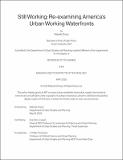Still Working: Re-examining America’s Urban Working Waterfronts
Author(s)
Zhang, Mabelle
DownloadThesis PDF (26.58Mb)
Advisor
Ben-Joseph, Eran
Terms of use
Metadata
Show full item recordAbstract
While American urban waterfronts once served as critical sites of production, they are now disappearing, reflecting larger de-industrialization trends. This thesis argues for a critical re-examination of the continued and evolving role that waterfronts play as sites of work. It expands the definition of urban working waterfronts to include sites of industry, production, and economic activity, thereby aligning with these sites’ historic and ongoing uses.
This thesis examines four working waterfronts in the Northeastern United States, a region with over 400 years of urban development driven by and around its waterfronts. This thesis examines this through four case studies: Central Waterfront in Portland, ME; Waterfront District in New Bedford, MA; Waterfront at Port Morris, NY; and Waterfront at Sunset Park, NY.
Through analyzing these cases, this thesis proposes a typology of working waterfronts :the Traditional Working Waterfront, the Industrial Working Waterfront, and the Hybrid Working Waterfront—based on key differences in uses, forms, and governance.
This thesis argues that the central issue is not merely protecting working waterfronts, but understanding how they are adapting to new realities. State and community-driven protections through zoning help protect existing working waterfronts, however; these sites are not stagnant relics of historic working waterfronts—rather, they are ever-evolving in response to new economic realities through incorporating new industries, technologies, and public access into their sites.
Date issued
2025-05Department
Massachusetts Institute of Technology. Department of Urban Studies and PlanningPublisher
Massachusetts Institute of Technology